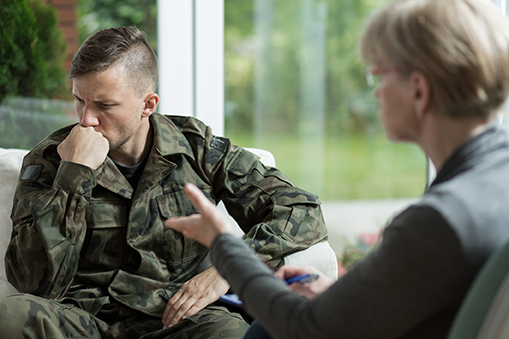Veterans with PTSD More Likely to Have Sexual Dysfunction

It’s not unusual for men and women returning from war to experience post-traumatic stress disorder (PTSD) – ongoing feelings of stress and anxiety that occur after a traumatic or frightening event. Recently, a team of experts from the United States studied the sexual health of veterans with PTSD.
The project included 1,581 male and female veterans who had served in Iraq and Afghanistan. All were participants in a study called the Veterans After-Discharge Longitudinal Registry (Project VALOR). Nine hundred eighty-seven had PTSD and 594 did not.
Based on the veterans’ responses to online questionnaires, the researchers found that those with PTSD were more likely to be diagnosed or treated for a sexual problem than those without the condition.
Over 70% of the men – with and without PTSD – reported being sexually active during the previous three months. But the situation was different for women. Only 59% of women with PTSD were sexually active during that time, compared to 72% of women without PTSD.
PTSD seemed to affect sexual satisfaction. Only 28% of men and 23% of the women with PTSD said they were satisfied with their sex lives. For both men and women without PTSD, the figure was 46%.
Other factors, such as medications, can affect a person’s sexual health, and in this study, the link between PTSD and sexual dysfunction became less clear cut when such factors were accounted for. However, the lower rates of sexual satisfaction suggested that veterans with PTSD could have overall sexual health issues that need medical attention.
The study was first published online in April in the Journal of Traumatic Stress.
Resources
Journal of Traumatic Stress
Breyer, Benjamin N., et al.
“Sexual Health in Male and Female Iraq and Afghanistan U. S. War Veterans With and Without PTSD: Findings From the VALOR Cohort”
(Abstract. Published online: April 26, 2016)
http://onlinelibrary.wiley.com/doi/10.1002/jts.22097/abstract
Medical Daily
Cara, Ed
“Veterans With PTSD More Likely To Report Dissatisfaction With Sex Life, Women Often Have Less Sex”
(June 7, 2016)
http://www.medicaldaily.com/veterans-ptsd-sex-life-dissatisfaction-388867
National Institute of Mental Health
“Post-Traumatic Stress Disorder”
(February 2016)
http://www.nimh.nih.gov/health/topics/post-traumatic-stress-disorder-ptsd/index.shtml
Wiley
“PTSD May Negatively Affect Sex Life Satisfaction in Male and Female Veterans”
(Press release. June 3, 2016)
http://www.wiley.com/WileyCDA/PressRelease/pressReleaseId-125904.html
You may also be interested in...
Other Popular Articles

What Is the Average Penis Size?
If you have ever wondered how your penis compares to others in terms of size, you are not alone. Many men are curious to know how their penises stack up compared to the average. Unfortunately, general curiosity can sometimes give way to full-on obsession and anxiety about penis size. This can be an unhealthy and often unnecessary fixation, especially because most men who think their penises are too small have perfectly normal-sized penises.

What Is Jelqing, and Does It Actually Work?
The term “jelqing” refers to a set of penis stretching exercises that some believe can make the penis bigger. Although the practice has gained attention and popularity in blogs and internet forums in recent years, there is no scientific evidence that it is an effective way to permanently increase the size of one’s penis. In fact, in some cases, jelqing may actually cause damage to the penis, so it is a good idea to get all the facts before setting off to try it.

What Is Sensate Focus and How Does It Work?
Sensate focus is a technique used to improve intimacy and communication between partners around sex, reduce sexual performance anxiety, and shift away from ingrained, goal-oriented sexual patterns that may not be serving a couple.

Can Sex Reduce Menstrual Cramps?
The SMSNA periodically receives and publishes ‘guest editorials.’ The current article was submitted by Mia Barnes, a freelance writer and researcher who specializes in women's health, wellness, and healthy living. She is the Founder and Editor-in-Chief of Body+Mind Magazine.
Having sex while you experience menstrual cramps is healthy and can provide significant benefits. While it might not be the first activity that comes to mind when your PMS or period cramping begins, many people enjoy sex to reduce menstrual cramps, experience increased pleasure and benefit from other advantages. Learn more about having sex while menstrual cramps are happening and how it can help your body.

How Long Does It Take the Average Man to Ejaculate?
On average, it takes a man between 5 to 7 minutes to orgasm and ejaculate during sexual intercourse.

Can Sex Throw off Your Vaginal pH Balance?
The SMSNA periodically receives and publishes ‘guest editorials.’ The current article was submitted by Mia Barnes, a freelance writer and researcher who specializes in women's health, wellness, and healthy living. She is the Founder and Editor-in-Chief of Body+Mind Magazine.
Your vagina is a pretty powerful organ. It is a pathway for menstrual blood and babies. It also is a main player in sexual intercourse. You might hear about your vagina’s pH and worry that yours is at risk. Here’s what to know about vaginal pH, including the impacts sex could have.
You are prohibited from using or uploading content you accessed through this website into external applications, bots, software, or websites, including those using artificial intelligence technologies and infrastructure, including deep learning, machine learning and large language models and generative AI.

